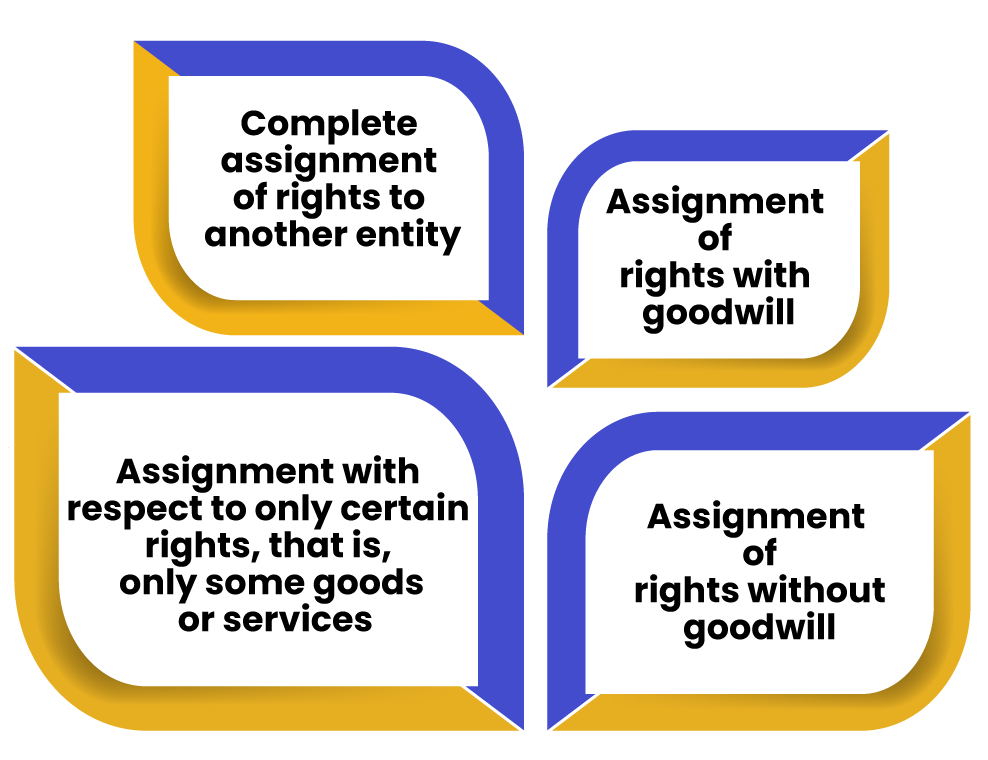Difference between Assignment and License under Trademarks Act, 1999

Japsanjam Kaur Wadhera | Updated: Feb 09, 2021 | Category: Trademark
A trademark is a mark which helps the owner of a brand to distinguish its products and services from the others. The trademark registration is important for a brand owner so as to get all the legal rights and benefits upon the registration. The trademark owner gets a right to transfer his rights with respect to the trademark wither by way of assignment or by licensing in India under the India Trademarks Act, 1999. This article will talk about the difference between assignment and license under Trademarks Act, 1999.
Table of Contents
What is Assignment of Trademark?
The assignment of trademark means when the ownership rights of the trademark is transferred from one person to another whether along with or without the goodwill of the business. In case of a registered trademark, the assignment of it is required to be recorded in the Register of Trademarks. The trademark assignment by one person to the other person can be done in the following manner:

Complete Assignment of Rights to another Entity
The owner has a right to completely transfer all his rights with respect to a mark to another entity, which also included the transfer of rights such as further transfer of rights, to earn royalty etc.
Assignment with Respect to only certain Rights, that is, only some Goods or Services
The owner of the trademark also has the right to transfer the ownership rights partially by transfer of ownership restricted to specific products or services. This is also called Partial assignment. The ownership of trademark is limited to only certain products or services.
Also, Read: What is the Trademark Assignment in India?
Assignment of Rights with Goodwill
When the owner of the trademark transfers his rights to another person along with the absolute ownership of the rights and values associated with the product to another person, it results into transfer of goodwill. That is, the owner shall make the assignment of rights along with the goodwill to the other person.
Assignment of Rights without Goodwill
When the owner of the trademark transfers his rights to another person without the rights and values associated with product, it results into assignment of rights without goodwill. It is also referred as gross assignment, where the owner of trademark restricts the rights of another person to whom assignment is made and does not allow him to use such brand for the products which are being used by the original owner. And thus, the goodwill attached to the brand with respect to the product is not transferred to another person.
Restrictions in respect to Assignment of Registered Trademark
The Trademark Act 1999 puts certain restriction on the assignment of registered trademarks where there exist any possibilities of confusion being created in the mind of the public. Such restrictions are as follows:
- The act restricts the assignment of rights that results in the creation of exclusive rights in more than one person with respect to the same products or services, or same description of products or services on such products or services as associated with one another.
- The act restricts the assignment of rights that results in using of trademark by different people in different parts of the country simultaneously.
What is Trademark Licensing?
The trademark licensing is to allow the others to use the mark without assigning any rights or ownership and the same can be done for all or for specific goods and services. The term “License” is not mentioned under the Trademarks act how it is mentioned as “registered user” under the act.
Trademark Licensing is beneficial and provides advantages to both the parties. Whereas, at the one hand the licensor enjoys its right to the trademark by getting royalty for its use by the other, on the hand the licensee gets the advantage to expand its market operations by using the brand to develop its reputation in the market.
In the cases of Licensing, the licensor allows to licensee the rights over the trademark in such a manner as he may like. The licensor has a right to restrict the rights of the licensee in a trademark or brand with respect to the products or services wherein the licensee is allowed to use the mark for a specified time period with respect to the area within which it can use such mark etc.
Trademark licensing is where the owner of the trademark allows the other entity to use the trademark and the ownership of trademark is not transferred or is not assigned to the other entity but a mere use of the trademark is permitted to be used by the licensee/ other entity.
Agreements for Transmission
Trademark Assignments are generally executed by way of trademark assignment agreements under which the transmission of the transfer takes place from one entity to another. The following points are required to keep in mind while drafting such agreements for the assignment and licensing of trademarks in India:
- The rights of the owner of the brand are not affected due to the obligations contained in such agreement.
- The requirement and decision regarding the assignment should be with or without the goodwill of the business is explicitly stated or mentioned and negotiated.
- The agreement must be drafted while keeping in mind the purpose of transaction in question.
A trademark is licensed by way of license agreement. According to Trademarks Act, 1999, the registration of license agreement with the trademark registrar is voluntary or not mandatory, contrary to the requirement in case of assignment. Also, like in assignment agreement, it is very important that while drafting a license agreement, the rights and duties of the licensee are pre- determined and defined. It is important not only to protect the rights of the licensor and protect the misuse but to also secure the rights of the licensee to use such brand.
What is the Difference between Assignment and License under the Trademarks Act?
Some of the differences between assignment and license under trademarks act are as follows:
- The assignment of trademark means the transfer of ownership of rights either completely or partially to another entity. Whereas, in license of trademark it means allowing another entity to use the trademark without transferring the rights to him and earn royalty in return of it.
- The assignment deed is mandatory in writing. License is not required to be in writing.
- The rights are transferred either wholly or partially in assignment of trademark, whereas in license of trademark the rights are given for a specific period of time.
Conclusion
Assignment and license of trademark is required to be done in accordance with the rules and procedures prescribed under the Indian Trademarks Act, 1999. When a company decides to enhance the business, it looks forward for purchasing trademark to support the motive of their business and create identity for themselves and ensure it is properly marketed. The difference between assignment and license under trademarks act is discussed above in the article and it is upon the owner of the trademark to decide whether he wishes to assign or license his trademark to the other entity.
Also, Read: All you Need to Know about Trademark Assignment in India?














